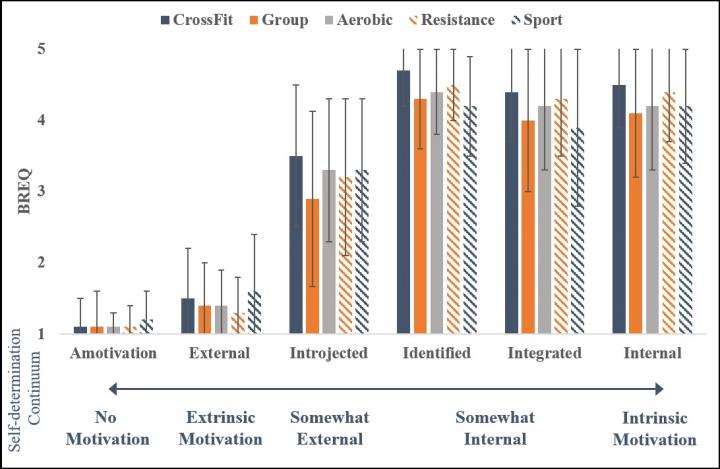Personality, motivation and level of self-determination all shown to influence the type of workout we choose (and for how long we stick with it!), according to a new study in Heliyon

Credit: Elsevier
London, April 30, 2019 – According to a new study differences in what motivates individuals and how they self-regulate behavior influence how they keep fit. The study appearing in the journal Heliyon, published by Elsevier, associates personal characteristics with whether people are likely to prefer solo or group exercise activities, CrossFit® training, resistance training, or team sports, how frequently they work out, and if they are likely to stick to their routine.
The investigators set out to better understand why individuals adopt and adhere to regular physical activity programs, whether differences exist in personality, participatory motives, and regulation-motivation styles associated with their exercise modes, and to determine the extent to which these factors predict their work-out frequency. Their findings show that individuals selecting CrossFit, sports, or group exercise were more highly motivated by social connectedness (affiliation) than those engaging primarily in aerobic (e.g., long distance running) or resistance training exercise. Although all participants were highly motivated to engage in physical activity for positive health, those who engaged in resistance training and sport were more motivated by a sense of challenge than ill-health avoidance or weight management.
The study also demonstrated that individual differences in exercise motivation and self-control can predict participation frequency. Individuals who were more motivated by intrinsic reasons such as enjoyment, challenge, and stress management, exercised more frequently; CrossFit participants ranked highest in intrinsic motivation. Prior research has shown that people who exercise typically are more extraverted and conscientious, compared to an average population, but this study did not find any significant personality trait variances linked with different forms of exercise.
“Many individuals who initiate exercise programs may actually select activities that conflict with their interests, styles, personalities, and/or reasons for engagement. Our findings support the need for individualized exercise programs, not only from a physical standpoint, but also from a motivational standpoint. Taking these factors into account may impact the amount of physical activity/exercise that individuals actually complete,” explained lead investigator Ms. Allyson Box. who began this work as an undergraduate student at Kennesaw State University, Kennesaw, GA, USA.
Data were collected from more than 400 physically active individuals who completed an online survey distributed via social media. Personality factors, motives for participation, and self-control styles were assessed using widely accepted frameworks including the Five Factor Model, revised Exercise Motivation Inventory, Self-determination Continuum, and Behavioral Regulation in Exercise Questionnaire.
Recent evidence suggests physical activity is important to decrease risks associated with metabolic, osteopathic, cardiovascular, and neurovascular diseases, as well as some cancers and mental health disorders. The positive impact of exercise on overall health is widely acknowledged, but most people tend to avoid physical activity and/or not stick with their regimen. Less than 20 percent of the population meets proposed Physical Activity Guidelines for Americans (2018) by engaging in at least 150 minutes of moderate intensity aerobic activity and at least two instances of resistance exercise each week. This lack of physical activity has resulted in an escalation of chronic diseases, such as diabetes or heart disease.
“We encourage individuals to reflect on their personality and reasons for becoming physically active before diving into a physical activity program to ensure they engage in a physical activity that is compatible with their interest, personality, and goals,” the authors added.
“Our findings suggest that it may be more than just seeking the latest ‘fitness fad’ or ‘new diet’ in order to influence health outcomes; identifying individual characteristics and motivational factors will aid in developing an exercise program that individuals will stick to over a prolonged period of time, not just a few months.”
—
Notes for editors
The article is “Individual Differences Influence Exercise Behavior: How Personality, Motivation, and Behavioral Regulation Vary Among Exercise Mode Preferences,” by Allyson G. Box, Yuri Feito, Chris Brown, and Steven J. Petruzzello (https:/
This study is published open access and can be downloaded by following the DOI link above.
In online coverage of this paper, please mention the journal Heliyon and link to the paper at https:/
Ms. Box, who is the lead author, started this project under the supervision of Yuri Feito, PhD at Kennesaw State University in her final year of her bachelor’s degree. Shortly after completing the data collection, she started at the University of Illinois at Urbana-Champaign, where she is currently completing a Master of Science in Kinesiology under the guidance of Steve Petruzzello, PhD.
About Heliyon
Heliyon is an open access journal from Elsevier that publishes robust research across all disciplines. The journal’s team of experts ensures that each paper meeting their rigorous criteria is published quickly and distributed widely. Led by Lead Editor, Paige Shaklee, the editorial team consists of over 1,000 active researchers who review papers on their merit, validity, and technical and ethical soundness. All published papers are immediately and permanently available on both Heliyon.com and ScienceDirect.
###
About Elsevier
Elsevier is a global information analytics business that helps scientists and clinicians to find new answers, reshape human knowledge, and tackle the most urgent human crises. For 140 years, we have partnered with the research world to curate and verify scientific knowledge. Today, we’re committed to bringing that rigor to a new generation of platforms. Elsevier provides digital solutions and tools in the areas of strategic research management, R&D performance, clinical decision support, and professional education; including ScienceDirect, Scopus, SciVal, ClinicalKey and Sherpath. Elsevier publishes over 2,500 digitized journals, including The Lancet and Cell, 39,000 e-book titles and many iconic reference works, including Gray’s Anatomy. Elsevier is part of RELX Group, a global provider of information and analytics for professionals and business customers across industries. http://www.
Media contact
Victoria Howard
Elsevier
+1 215 239 3589
[email protected]
Media Contact
Victoria Howard
[email protected]
Original Source
https:/
Related Journal Article
http://dx.




